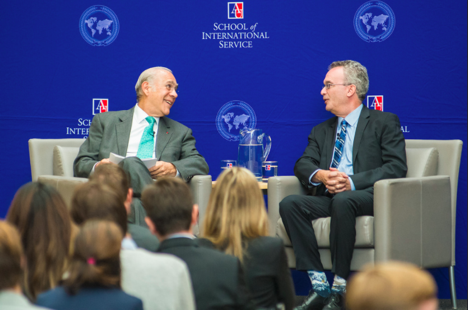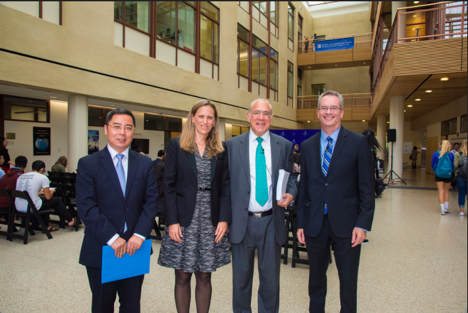
OECD Secretary General Angel Gurría and American University School of International Service Dean James Goldeiger
Model UN delegates always joke about the overuse of “short and long term solutions.” I can guarantee that myself and the rest of the American University MUN team were all silently chuckling to ourselves when we heard Chinese Minister Li Kexin use the exact phrase.
However, short and long term solutions, 28 outcome documents, and three action plans were the very successful outcome of the 2016 G20 Summit that took place in Hangzhou, China in early September.
Just a short month later, on October 6th, 2016, the American University School of International Service was proud to host the inaugural event for the first US-based Model G20 Initiative. To take place from March 17th-19th, American University will be hosting teams of undergraduate students from across the country to participate as member states of the Group of 20 and international organizations to engage in an accurate G20 Leader’s Summit. The American University International Relations Society will be serving as Germany, the G20 Presidency.
Speakers at the launch event included American University School of International Service Dean James Goldgeier, Minister Li from the Embassy of the People’s Republic of China, Secretary General Angel Gurría of the Organization of Economic Co-operation and Development (OECD), and Professor Cecilia Nahón who is the Executive Program Director for the Model G20 Initiative as well as the former Ambassador of Argentina to the US and former Argentinian Sherpa to the G20.
Unlike most international organizations, the G20 does not have a bureaucratic structure in place. It operates without a permanent secretariat or staff. Instead, leadership rotates among its member states on a yearly basis. In December, Germany will take over the presidency from China and will have the opportunity to set forth its own agenda priorities for the upcoming summit in Hamburg in July.
The G20 maintains a strong position in the international community because of its prominent membership. It is the only international forum where leaders of the largest advanced and emerging economies can meet on an annual basis to personally discuss the challenges of the global economy. Such a forum has also presented itself to be opportune for member states to discuss other geopolitical issues if required, such as its meetings regarding the 2015 Paris terror attacks and the 2013 situation in Syria. Reflecting on the contributions and challenges of the G20 from the OECD’s perspective, Secretary General Gurria highlighted: “its response to the global financial crisis is an excellent example of its nature […] to coordinate macroeconomic policies, develop the largest internationally coordinated stimulus package in history, and spearhead new approaches to financial regulation and to financial supervision.”

From left to right: Minister Li, Ambassador Nahón, Secretary General Gurria, and Dean Goldgeier
Minister Li asked himself how we can keep the G20 effective. His answer? Implementation. Just like Model UN, the feasibility and effectiveness of any solution lies in its ability to be implemented. He cited that the G20 is becoming less of a crisis response mechanism and more of an institution for long term governance, showing the G20’s ability to adapt to changing global needs. Just like the G20 is reconsidering its role in the global order, the role of any international body is something every Model UN delegate must consider when thinking of solutions for their respective committees.
Watch the full event here.
To learn more about American University’s Model G20 Initiative, click here.


